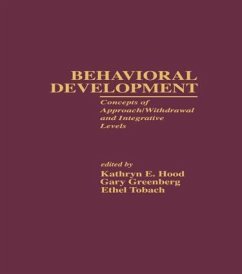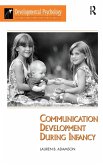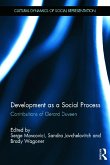Kathryn E. Hood (ed.)
Behavioral Development
Concepts of Approach/Withdrawal and Integrative Levels
Herausgeber: Hood, Kathryn E.; Tobach, Ethel; Greenberg, Gary
Kathryn E. Hood (ed.)
Behavioral Development
Concepts of Approach/Withdrawal and Integrative Levels
Herausgeber: Hood, Kathryn E.; Tobach, Ethel; Greenberg, Gary
- Gebundenes Buch
- Merkliste
- Auf die Merkliste
- Bewerten Bewerten
- Teilen
- Produkt teilen
- Produkterinnerung
- Produkterinnerung
First Published in 1995. Routledge is an imprint of Taylor & Francis, an informa company.
Andere Kunden interessierten sich auch für
![Family, Self, and Human Development Across Cultures Family, Self, and Human Development Across Cultures]() Çigdem KagitçibasiFamily, Self, and Human Development Across Cultures211,99 €
Çigdem KagitçibasiFamily, Self, and Human Development Across Cultures211,99 €![Development of Adult Thinking Development of Adult Thinking]() Development of Adult Thinking200,99 €
Development of Adult Thinking200,99 €![Humanitarian Work Psychology and the Global Development Agenda Humanitarian Work Psychology and the Global Development Agenda]() Humanitarian Work Psychology and the Global Development Agenda233,99 €
Humanitarian Work Psychology and the Global Development Agenda233,99 €![Theories of Development Theories of Development]() William CrainTheories of Development288,99 €
William CrainTheories of Development288,99 €![Communication Development During Infancy Communication Development During Infancy]() Lauren B AdamsonCommunication Development During Infancy200,99 €
Lauren B AdamsonCommunication Development During Infancy200,99 €![Contemporary Career Development Issues Contemporary Career Development Issues]() Contemporary Career Development Issues56,99 €
Contemporary Career Development Issues56,99 €![Development as a Social Process Development as a Social Process]() Development as a Social Process211,99 €
Development as a Social Process211,99 €-
-
-
First Published in 1995. Routledge is an imprint of Taylor & Francis, an informa company.
Hinweis: Dieser Artikel kann nur an eine deutsche Lieferadresse ausgeliefert werden.
Hinweis: Dieser Artikel kann nur an eine deutsche Lieferadresse ausgeliefert werden.
Produktdetails
- Produktdetails
- Verlag: Routledge
- Seitenzahl: 492
- Erscheinungstermin: 1. März 1995
- Englisch
- Abmessung: 222mm x 145mm x 32mm
- Gewicht: 819g
- ISBN-13: 9780815317098
- ISBN-10: 0815317093
- Artikelnr.: 21419702
- Herstellerkennzeichnung
- Books on Demand GmbH
- In de Tarpen 42
- 22848 Norderstedt
- info@bod.de
- 040 53433511
- Verlag: Routledge
- Seitenzahl: 492
- Erscheinungstermin: 1. März 1995
- Englisch
- Abmessung: 222mm x 145mm x 32mm
- Gewicht: 819g
- ISBN-13: 9780815317098
- ISBN-10: 0815317093
- Artikelnr.: 21419702
- Herstellerkennzeichnung
- Books on Demand GmbH
- In de Tarpen 42
- 22848 Norderstedt
- info@bod.de
- 040 53433511
Hood, Kathryn E.; Greenberg, Gary; Tobach, Ethel
Series Editors' Preface
Introduction
I. The Concept of Approach/Withdrawal as Fundamental to the Analysis of Behavioral Development
1. The Historical Development of the Approach/Withdrawal Concept
2. Dialectical and Dynamical Systems of Approach and Withdrawal: Is Fighting a Fractal Form?
3. Approach/Withdrawal Theory and Comparative Psychology
4. Schneirla's A/W Biphasic Processes Theory
II. Approach/Withdrawal-Biochemical and Neural Processes
5. Cellular and Network Processes Involved in Biphasic Responses to Noxious Stimulation in Aplysia: Prospects for a Reductionist Analysis
6. Nerve Growth Factor and Cholinergic Development: Biochemical Levels in Approach/Withdrawal Processes
7. What and Where Are Memories?
III. Approach/Withdrawal-Socialization
8. An Analysis of Approach/Withdrawal Processes in the Initiation of Maternal Behavior in the Laboratory Rat
9. The Mediation of Aggressive Behavior in Mice: A Discussion of Approach/Withdrawal Processes in Social Adaptations
10. Beyond Attachments: Toward a General Theory of the Development of Relationships in Infancy
IV. Approach/Withdrawal and Individual Differences
11. The Approach/Withdrawal Concept: Associations with Salient Constructs in Contemporary Theories of Temperament and Personality Development
12. Approach/Withdrawal Processes in Infancy: The Relationship between Parasympathetic Tone and Infant Temperament
V. The Concept of Levels in Approach/Withdrawal Theory
13. One View of the Concept of Integrative Levels
14. The Concept of Levels of Integration
15. Definitions of Levels of Integration
16. The Integration of Levels and Human Development: A Developmental Contextual View of the Synthesis of Science and Outreach in the Enhancement of Human Lives
Epilogue
Contributors
Index
Introduction
I. The Concept of Approach/Withdrawal as Fundamental to the Analysis of Behavioral Development
1. The Historical Development of the Approach/Withdrawal Concept
2. Dialectical and Dynamical Systems of Approach and Withdrawal: Is Fighting a Fractal Form?
3. Approach/Withdrawal Theory and Comparative Psychology
4. Schneirla's A/W Biphasic Processes Theory
II. Approach/Withdrawal-Biochemical and Neural Processes
5. Cellular and Network Processes Involved in Biphasic Responses to Noxious Stimulation in Aplysia: Prospects for a Reductionist Analysis
6. Nerve Growth Factor and Cholinergic Development: Biochemical Levels in Approach/Withdrawal Processes
7. What and Where Are Memories?
III. Approach/Withdrawal-Socialization
8. An Analysis of Approach/Withdrawal Processes in the Initiation of Maternal Behavior in the Laboratory Rat
9. The Mediation of Aggressive Behavior in Mice: A Discussion of Approach/Withdrawal Processes in Social Adaptations
10. Beyond Attachments: Toward a General Theory of the Development of Relationships in Infancy
IV. Approach/Withdrawal and Individual Differences
11. The Approach/Withdrawal Concept: Associations with Salient Constructs in Contemporary Theories of Temperament and Personality Development
12. Approach/Withdrawal Processes in Infancy: The Relationship between Parasympathetic Tone and Infant Temperament
V. The Concept of Levels in Approach/Withdrawal Theory
13. One View of the Concept of Integrative Levels
14. The Concept of Levels of Integration
15. Definitions of Levels of Integration
16. The Integration of Levels and Human Development: A Developmental Contextual View of the Synthesis of Science and Outreach in the Enhancement of Human Lives
Epilogue
Contributors
Index
Series Editors' Preface
Introduction
I. The Concept of Approach/Withdrawal as Fundamental to the Analysis of Behavioral Development
1. The Historical Development of the Approach/Withdrawal Concept
2. Dialectical and Dynamical Systems of Approach and Withdrawal: Is Fighting a Fractal Form?
3. Approach/Withdrawal Theory and Comparative Psychology
4. Schneirla's A/W Biphasic Processes Theory
II. Approach/Withdrawal-Biochemical and Neural Processes
5. Cellular and Network Processes Involved in Biphasic Responses to Noxious Stimulation in Aplysia: Prospects for a Reductionist Analysis
6. Nerve Growth Factor and Cholinergic Development: Biochemical Levels in Approach/Withdrawal Processes
7. What and Where Are Memories?
III. Approach/Withdrawal-Socialization
8. An Analysis of Approach/Withdrawal Processes in the Initiation of Maternal Behavior in the Laboratory Rat
9. The Mediation of Aggressive Behavior in Mice: A Discussion of Approach/Withdrawal Processes in Social Adaptations
10. Beyond Attachments: Toward a General Theory of the Development of Relationships in Infancy
IV. Approach/Withdrawal and Individual Differences
11. The Approach/Withdrawal Concept: Associations with Salient Constructs in Contemporary Theories of Temperament and Personality Development
12. Approach/Withdrawal Processes in Infancy: The Relationship between Parasympathetic Tone and Infant Temperament
V. The Concept of Levels in Approach/Withdrawal Theory
13. One View of the Concept of Integrative Levels
14. The Concept of Levels of Integration
15. Definitions of Levels of Integration
16. The Integration of Levels and Human Development: A Developmental Contextual View of the Synthesis of Science and Outreach in the Enhancement of Human Lives
Epilogue
Contributors
Index
Introduction
I. The Concept of Approach/Withdrawal as Fundamental to the Analysis of Behavioral Development
1. The Historical Development of the Approach/Withdrawal Concept
2. Dialectical and Dynamical Systems of Approach and Withdrawal: Is Fighting a Fractal Form?
3. Approach/Withdrawal Theory and Comparative Psychology
4. Schneirla's A/W Biphasic Processes Theory
II. Approach/Withdrawal-Biochemical and Neural Processes
5. Cellular and Network Processes Involved in Biphasic Responses to Noxious Stimulation in Aplysia: Prospects for a Reductionist Analysis
6. Nerve Growth Factor and Cholinergic Development: Biochemical Levels in Approach/Withdrawal Processes
7. What and Where Are Memories?
III. Approach/Withdrawal-Socialization
8. An Analysis of Approach/Withdrawal Processes in the Initiation of Maternal Behavior in the Laboratory Rat
9. The Mediation of Aggressive Behavior in Mice: A Discussion of Approach/Withdrawal Processes in Social Adaptations
10. Beyond Attachments: Toward a General Theory of the Development of Relationships in Infancy
IV. Approach/Withdrawal and Individual Differences
11. The Approach/Withdrawal Concept: Associations with Salient Constructs in Contemporary Theories of Temperament and Personality Development
12. Approach/Withdrawal Processes in Infancy: The Relationship between Parasympathetic Tone and Infant Temperament
V. The Concept of Levels in Approach/Withdrawal Theory
13. One View of the Concept of Integrative Levels
14. The Concept of Levels of Integration
15. Definitions of Levels of Integration
16. The Integration of Levels and Human Development: A Developmental Contextual View of the Synthesis of Science and Outreach in the Enhancement of Human Lives
Epilogue
Contributors
Index








